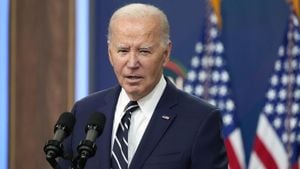The region of Abkhazia, located along the Black Sea, has seen significant unrest recently, culminating in the resignation of its separatist leader, President aslan Bzhania, after days of protests and clashes between police and demonstrators.
The turmoil began on Friday when opposition protesters, fueled by anger over new laws permitting Russian citizens to buy property within the region, stormed government buildings. This unrest was not only motivated by economic factors but also concerns about the increasing influence of Moscow on Abkhazia's autonomy.
At least 14 individuals sustained injuries during chaotic confrontations with law enforcement. These clashes arose as demonstrators blocked key bridges leading to the capital, Sukhumi, and hurled rocks at police who responded with tear gas. The protests were sparked by the arrest of five opposition leaders at previous demonstrations, igniting calls for Bzhania’s resignation.
Bzhania, who had been leading since 2020, agreed to resign provided the protesters vacated the occupied government buildings. This standoff prompted negotiations, lasting more than nine hours, resulting in his eventual resignation approved by the regional parliament on Tuesday.
Following Bzhania's resignation, Vice President Badra Gunba assumed the role of acting president. This transition occurred under the shadow of uncertainty surrounding Abkhazia’s future and its complex relationship with Russia. Much of the local population of around 245,000 fears their homeland is becoming increasingly dependent on Moscow, complicates their struggle for international recognition and autonomy.
Abkhazia declared independence from Georgia following the Soviet Union's collapse and is still seen as part of Georgia by many nations, including the United States and European Union. Meanwhile, Russia formally recognized Abkhazia as independent after the conflict with Georgia in 2008. Yet, many residents are apprehensive about their future, fearing they may be trapped as a "client state" of Russia.
While Abkhazia could attract Russian tourists, especially to its picturesque resorts, the new property law is viewed with dread by locals, who worry about losing their sovereignty. These anxieties reflect broader sentiment; many worry closer ties to Russia may compromise their long-term independence.
Despite Bzhania's resignation resolving immediate tensions, it doesn't address the underlying issues of sovereignty and the pressures from Moscow. The protests and the subsequent governmental shift signal discontent with current leadership and highlight the fragility of stability within Abkhazia.
Right now, the streets may be calmer, but the dilemmas concerning Abkhazia's sovereignty, its economic ties, and the looming question of freedom from Georgian oversight linger ominously.



